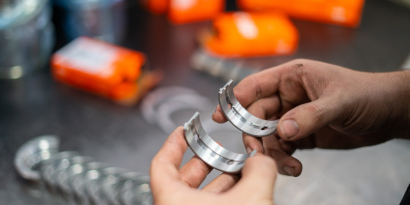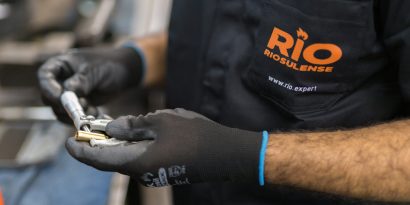If a few years ago innovating was an exclusive luxury of large corporations, today this is the basic premise to stand out in an increasingly competitive market. And as a movement that involves the entire production chain, nothing is more natural for companies than also looking for suppliers that invest in innovation. For an example, the “Global Innovation 1000” study, conducted by PwC, points at an increase of 11.4% on investments in research and development between 2018 and 2019.
The big catch, however, is that this investment has been made more and more homogeneously among small, medium and large companies. Especially in the supply and transformation sector, such as metallurgy and foundries, which fulfill the important role of supplying the major national and international vehicle manufacturers. That means the search for innovation is already being assimilated as part of a new model of industrial culture, albeit at a slow pace.
And perhaps one of the most interesting points of this new approach is the fact that, unlike the popular belief, the implementation of new ideas has not always meant the creation of new business models or large investments. Very often, the focus on process improvement, technological updates or the simple fact of being attentive to customer demands are more than enough initiatives to make the difference and transform the working routine.
The challenges of innovation in the automotive industry
The automobile market has always been used to evolve quickly, and it is easy to understand why. Each year, consumers receive more powerful vehicles, with differentiated designs and more integrated technologies. However, those who work and live the daily routine of the automakers and the automotive industry know this delivery pattern itself is not enough to fulfill the needs of the market.
After all, the time for hegemony is over: it is necessary to fight for space in the purchase intention and, therefore, the automakers must find creative and functional ways to practice competitive prices that fit in the customer’s budget. At the same time, the consumer, increasingly concerned and judicious about the product he buys, is also looking for a car that delivers performance, comfort and quality.
In this context, it is not necessary to go very far to understand the equation. Selling cars at lower prices will compromise the company’s revenue. Selling cars at high prices will decrease sales and age the fleet. On the other hand, cutting costs with raw materials or the production chain might negatively affect the customer’s satisfaction.
However, there is hope and it has a name: innovation! In these cases, it is important that companies channel their efforts in the optimization of time, financial resources and, of course, human resources. Especially in the case of automakers in the automotive sector, in which a leaner, more agile management model, with lower cost and higher quality, must be present since the beginning of the production chain — and this is where we prove the importance of having suppliers that invest in innovation!
The impact of suppliers who invest in innovation for the quality of the industry
There are many ways to innovate and they all have a direct impact on business results. Updating management models and modernizing the work culture are some examples. However, when the automaker works with a supplier that also invests in innovation and, consequently, delivers better quality raw materials, then we have a cycle that has a direct relationship with the final product, influencing the entire production chain.
Now, if the investment of automakers in innovative practices aims at a better-finished product and at a superior quality, it is safe to assume that suppliers who invest in innovation share this objective, right? It means the automotive industry can count on partners who also dedicate efforts to the design of more efficient models of production, distribution and application of their products.
More than that, the production chain benefits greatly in that process: in addition to receiving parts, inputs and equipment that have undergone rigorous quality processes, the automakers still count on the certainty of always working beside up-to-date suppliers with modern and effective solutions.
And that’s because the key elements of the automotive industry involve much more than nuts and screws. Nowadays, electronic technologies are strongly integrated into the parts that make up a vehicle’s engine, transmission, chassis and brakes systems, creating even more complex components. Just think about the current sensors and electronic devices that are incorporated in ordinary components.
These small equipment are coupled to the head gaskets, guides and camshafts, so that all the data about the wheel loads, torque levels and thermal conditions can be sent to the vehicle in order to improve safety, handling and, of course, keep the driver aware of all these conditions.
In addition, such technology requires that these parts and equipment already come from the supplier suitable and ready for joint application with the technology. Just understanding how to forge, manufacture or assemble a part to meet customer specifications is no longer enough, and a supplier that invests in innovation knows this!
That way, he will always invest in training the labor to fully understand the operation value and the characteristics of each part. Not to mention that, by working with a partner who shares his vision for the future, the automotive industry is able to promote a more dynamic exchange of information, documents, purchase orders, engineering reviews, non-conformity records and quality/ performance indicators. In practical words: higher productivity and much more precision in identifying and solving problems.
Riosulense: innovation from the inside out
With over 70 years of experience in the automotive sector, Metalúrgica Riosulense produces original solutions that serve utilities, trucks and agricultural and railway machinery, always with the quality attested by the experience and by the national and international certifications that it has conquered along its trajectory. Riosulense is an industry in constant transformation that understands very well the importance of investing in innovation to guarantee quality and sustainability in an increasingly competitive market.
Here, innovation is much more than a concept: our production chain has optimized processes, ready to meet the needs of the largest automakers in the world. With dedicated and trained technical engineering teams, the extensive investment in technology and processes innovation is already part of our culture.
Take as an example Riosulense’s innovation incentive programs such as “Grande Projeto da Virada” (Great New Year’s Project), whose focus is the promotion of internal initiatives that contribute to increase productivity, eliminate production bottlenecks and enhance the quality and assertiveness indexes in the production line.
This is how the project works: employees and technicians, directly involved with the production line and with the development of projects, can submit ideas that, in some way, can contribute to the optimization of processes. The best projects are selected and put into practice, and the winners are awarded. In Riosulense’s vision, this “competition” is a way of recognizing and engaging employees who have a team spirit while encouraging constant improvement in the industrial environment.
Obviously, the counterpart of an engaged team that constantly looks for continuous improvement is the certainty and security in the ability to develop fully customizable parts, models and prototypes that meet the highest quality standards in the global market. Why don’t you give us a shot? Get in touch with our technical team and discover how Riosulense can be a powerful ally of your transformation!





